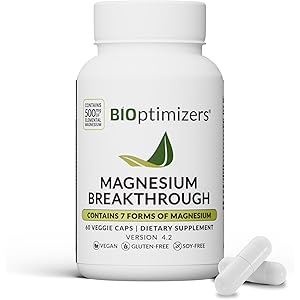BIOptimizers Magnesium Breakthrough Complex Supplement with 7 Forms of Mg: Glycinate, Malate, Citrate, and More - Natural Support for Sleep and Cognitive Function - 60 Capsules- Calming Vitamins
$39.95 (as of October 27, 2025 06:27 GMT +00:00 - More infoProduct prices and availability are accurate as of the date/time indicated and are subject to change. Any price and availability information displayed on [relevant Amazon Site(s), as applicable] at the time of purchase will apply to the purchase of this product.)Understanding Dietary Supplements Regulations
Dietary supplements are products intended to supplement the diet and may include vitamins, minerals, herbs, amino acids, and other substances. The regulations governing these products are crucial for ensuring consumer safety and product efficacy. In the United States, the Food and Drug Administration (FDA) oversees the regulation of dietary supplements, but it is important to note that these products are not subject to the same rigorous testing and approval processes as prescription medications.
FDA’s Role in Dietary Supplements
The FDA plays a significant role in the regulation of dietary supplements. Under the Dietary Supplement Health and Education Act (DSHEA) of 1994, the FDA is responsible for ensuring that dietary supplements are safe and labeled accurately. However, it is the responsibility of manufacturers to ensure that their products are safe before they are marketed. This means that the FDA does not approve dietary supplements before they reach the market, which can lead to concerns about product quality and safety.
Labeling Requirements for Dietary Supplements
One of the key regulations for dietary supplements involves labeling requirements. The labels must include a statement of identity, a net quantity of contents, and a nutrition label that lists the dietary ingredients. Additionally, any claims made on the label must be truthful and not misleading. The FDA requires that any health claims, nutrient content claims, or structure/function claims be substantiated by scientific evidence, ensuring that consumers receive accurate information about the products they are purchasing.
Good Manufacturing Practices (GMP)
Good Manufacturing Practices (GMP) are essential regulations that dietary supplement manufacturers must adhere to. These practices ensure that products are consistently produced and controlled according to quality standards. The FDA has established GMP regulations specifically for dietary supplements, which cover all aspects of production, including raw material sourcing, manufacturing processes, and quality control measures. Compliance with GMP helps to minimize the risk of contamination and ensures that products meet their labeled potency.
Adverse Event Reporting
Another important aspect of dietary supplement regulation is the requirement for manufacturers to report adverse events. If a consumer experiences an adverse reaction to a dietary supplement, the manufacturer is obligated to report this information to the FDA. This reporting system helps the FDA monitor the safety of dietary supplements on the market and take action if necessary, such as issuing warnings or recalls for products that may pose a risk to consumers.
Claims and Marketing Regulations
The marketing of dietary supplements is also subject to specific regulations. While manufacturers can make certain claims about their products, these claims must be supported by scientific evidence. Health claims, which suggest that a dietary supplement can reduce the risk of a disease or health condition, require pre-approval from the FDA. In contrast, structure/function claims, which describe the role of a nutrient or dietary ingredient in maintaining normal body functions, do not require pre-approval but must still be truthful and not misleading.
International Regulations on Dietary Supplements
Regulations for dietary supplements vary significantly across different countries. In the European Union, for example, dietary supplements are regulated under the Food Supplements Directive, which sets out specific requirements for labeling, safety, and health claims. Understanding these international regulations is crucial for manufacturers looking to market their products globally, as compliance with local laws is necessary to avoid legal issues and ensure consumer safety.
Consumer Awareness and Education
Consumer awareness and education play a vital role in the regulation of dietary supplements. As consumers become more informed about the potential risks and benefits of these products, they are better equipped to make educated choices. Regulatory agencies, such as the FDA, provide resources and information to help consumers understand what to look for when purchasing dietary supplements, including how to read labels and recognize misleading claims.
The Future of Dietary Supplement Regulations
As the dietary supplement industry continues to grow, there is an ongoing discussion about the need for stricter regulations. Advocates for increased regulation argue that more oversight is necessary to protect consumers from unsafe products and misleading claims. On the other hand, some industry representatives caution that overly stringent regulations could stifle innovation and limit consumer access to beneficial supplements. The future of dietary supplement regulations will likely involve a balance between consumer protection and industry growth.


